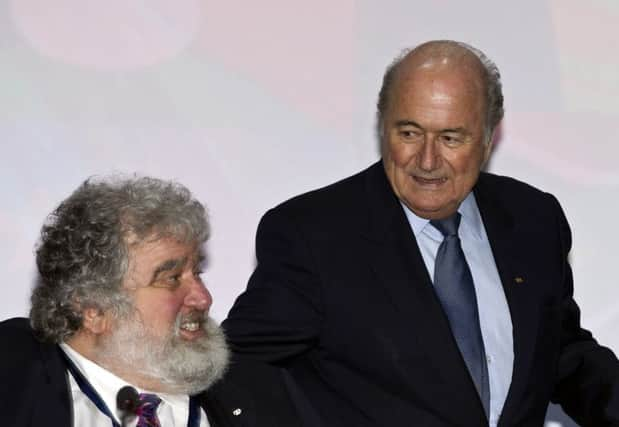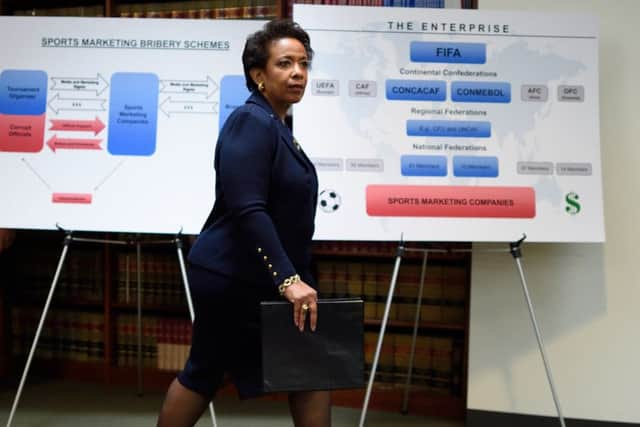Comment: Blatter may survive Fifa’s darkest day


Yet, when wakes up today and prepares to open Fifa’s annual congress, the 79-year-old Swiss will find himself clinging to power as he tries to fend off renewed calls for his resignation after the most unexpected day of corruption allegations, even by the standards of Fifa’s tarnished reputation.
Or will he?
In all likelihood, Blatter will still win tomorrow’s election when he goes head to head with Jordan’s Prince Ali bin al-Hussein, and move into a fifth term. The question is now, will the vote be closer than it might have been following a series of headline-grabbing revelations, or will Blatter storm to victory by an even greater margin?


Advertisement
Hide AdAdvertisement
Hide AdIf the latter of those scenarios sound implausible, one train of thought doing the rounds last night was that far from working against Blatter, the arrest of seven senior Fifa officials by Swiss authorities at the behest of US investigators smacked of interfering Big Brother tactics that might actually backfire when it comes to the ballot itself.
The election, you see, is not conducted by fans, players or clubs. If it were, Blatter would have been out on his ageing – and no doubt aching – feet ages ago. There are 209 electors, many of them representing small footballing nations, and Blatter has been working his magic on them for years.
So, barring any unexpected upsets, he will achieve a fifth four-year term and remain in charge of a multi-billion-dollar sport, buoyed by the fact that no matter how much wrongdoing has occurred under his regime, he can plough on regardless.
It shouldn’t be like that, of course, and Uefa last night threatened to boycott the election, an understandable but foolhardy move since Europe is the only confederation firmly behind Prince Ali. One Swiss newspaper jokingly described Blatter recently as “the dark prince of football, the godfather, Don Blatterone” – but no inquiry has ever revealed proof of his involvement in bribery. Whatever his critics say, he is the ultimate survivor whose career has outlasted three marriages, who promised to clean up Fifa when re-elected unopposed four years ago and who now, barring the most unlikely of upsets tomorrow, looks set to ride out Fifa’s darkest day.
But. pause for a minute to digest the full impact of yesterday’s series of stunning news-breaking events, each adding an extra layer to what the US justice authorities all but described as a conspiracy of corruption. It started with that dawn raid, continued with Swiss police announcing they were to question ten leading Fifa individuals in connection with the 2018 and 2022 World Cup bid process and ended with a staggering 47-count US indictment that laid bare two generations of malpractice among officials both past and present.
While questions should certainly be asked about whether Blatter, as the boss, should have known about what was going on under his watch and do the honourable thing by throwing in the towel having seen his organisation plunged into such chaos, he remains an easy target. The fact is that those who vote for him are national associations who are every bit as unaccountable as Fifa’s administration. Rightly or wrongly, they are more interested in receiving their perfectly legal annual payouts from Fifa than getting to grips with corruption.
That, of course, should not be allowed to detract from the sheer magnitude of the latest accusations and arrests. But, while much of the blame deserves to be directed at Blatter, consider the shame now heaped on the man who not so long ago was touted as a potential successor.
When Jeffrey Webb took over from the disgraced Jack Warner, becoming Fifa vice-president as well as head of Concacaf, he was viewed as precisely the kind of refreshing figure Fifa needed as it mapped out a future of transparency and credibility.
Advertisement
Hide AdAdvertisement
Hide AdWebb, head of Fifa’s anti-racism task force, said all the right things about inclusion and openness. When you needed someone to preach the gospel of reform and evolution, Webb would invariably provide it. Now we know that Webb, cited in the US indictment and who last night was in custody in Zurich, simply took over Warner’s mantle. A more depressing scenario is hard to imagine.
So who can you actually trust after Fifa’s darkest day, one that ended with typical Blatter platitudes proclaiming Fifa would have to work harder to clean itself up? It’s a good question and one which the new-look executive committee, comprising no fewer than nine unfamiliar faces, would do well to ask itself when it meets on Saturday for the first time.
The talk among the new members will doubtless be of a new era, one to sweep away Fifa’s shady past and create a robust, trustworthy organisation.
The problem is that mud sticks and there was so much of it flying around yesterday that it will take an eternity, especially with Blatter still in charge, for such trust to be restored.